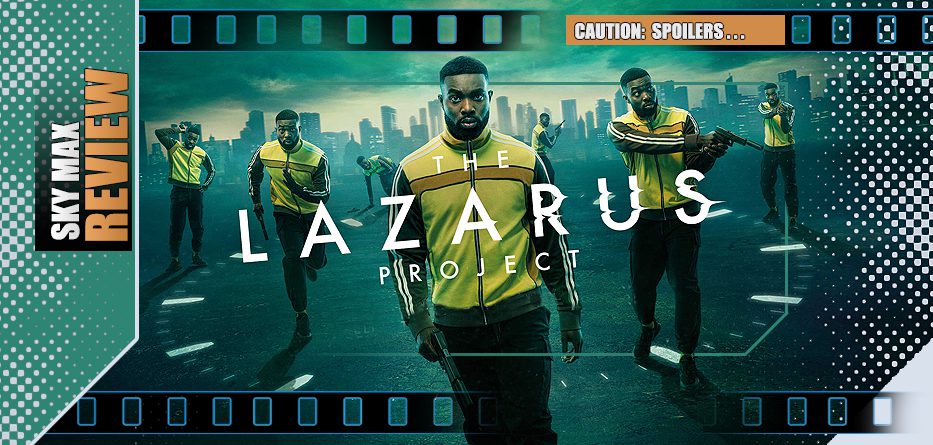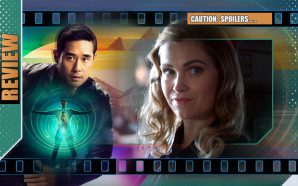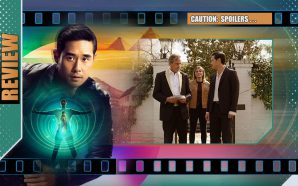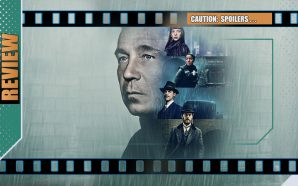George may have had a personal victory in his attempts to rewind time, but the larger Lazarus Project discovers that a rival initiative has created their own way of flexing the time-stream and the combination of two black-hole-empowered systems has now doomed the universe to an ever-diminishing wash-and-repeat cycle. The Project’s system offers no way to break out of it, but did the rival’s very different operating system offer a chance? Now the team must race against a very unforgiving clock to find a chronological loophole and thread on which to pull. But if so, that may mean travelling further back than before with unpredictable consequences and still at the mercy of events that are fated to happen.
And when it’s clear that there are other agendas at work, it becomes a case of not trusting the information they have, the people they work with or even themselves… because ten years ago, choices were made because of the future. Or is that the other way around?
*spoilers*
There are a handful of shows that come storming out of the gates and unexpectedly impress, instantly receiving cult status and, yet, all-too-often, still get limited to a one-and-out fate due to a multitude of reasons. We can all think of the times when we’ve soared with a new arrival and then been crushed by news of its cancellation. We all have our favourites… in my case: Ultraviolet, Firefly. SKY‘s The Lazarus Project, one of the most satisfying, demanding and fun time-travel shows in years, debuted in 2022 and felt like it might be on the list, but thankfully did get confirmation of a second run and it’s arrived back on SKY this month. It’s the kind of show that rewards you for sticking with it, but it also needed a huge media push (and, sadly, it might well have gone under the radar with so many other time-travel shows currently grabbing the headlines)….
Some shows are better watched episodically, others in a binge-watch sit-down and it’s hard to pigeon-hole into which The Lazarus Project now falls. Certainly, it would impossibly test the patience and memory if it were a weekly drop, but it’s also an eight-part serial that would test the best of us as an all-in-one. Despite a ‘Previously on…‘ intro, one needs to be honest and say that this isn’t designed for the casual viewer or anyone who didn’t see the 2022 run. (Somewhere in the heart of Sky Studios‘ secret headquarters – that, despite being so good in the 2022 run, sadly never answered multiple requests for screeners this time – there’s a white-board covered in the kind of mathematical formulas and intricate multi-coloured flowcharts almost guaranteed to indue an aneurysm in even the most physics-savvy sf fan).
The set-pieces, when they come, are great, but feel more like the glory days of Spooks (MI:6 if you were in the US) on steroids rather than Mission Impossible on cruise control. Instead, it’s intense 3D chess, 4D espionage and 5D Scrabble combined as the main players try to work out not just what’s going on, but if they can even trust themselves…
The first season was complex, heartfelt, smart and – despite it being about the well-worn concept of time-travel, felt both original and familiar. It took the concept seriously and looked at the explosive and the emotional questions raised about rewinding the world from tragedy – literally time and time again. It took us not just through the end of the world, but intimate grief – the repeated birth and loss of a child, weighing the death of many with the death of one, the chance to correct things yet still mess them up… and also how bizarre it would be to be an everyman thrown into that chaotic mix. Paapa Essiedu’s George was a laconic lead, as befuddled as the rest of us at the start and yet driven to make certain choices we couldn’t really blame him for, despite the eventual cost. You had to pay attention to the first run as it weaved its way through rewinds and alternative outcomes but despite the ‘If we die, we just rewind‘ aspect, the stakes always felt high. It was also the kind of show that majestically paid-off what you’d already seen with new twists, explaining the many layers of story for the faithful and making you want to immediately go back to previous scenes and think ‘I see what they did there!‘ – something of a rarity in modern drama’s formula for instant gratification. It’s this aspect that the second run cranks up and I defy anyone not to hit the pause button multiple times and exclaim ‘Wait, I’m not sure I follow who/when etc…‘ and sometimes without a clear explanatory pay-off. Season Two laughs in the face of mobius-strips and rips them to pieces in a way that delights and frustrates in equal measure – nowhere near as clean and ultimately satisfying as the original run, but still more than enough to keep you watching.
If the first season gave us set-pieces that would have looked just as good at the multiplex – epic car-chases, explosions, European capital battles and more, then the second season dials those back just a bit. It’s clear that money is still being spent here, the European locations and earnest chases continue, but it’s being used more carefully rather than being splashed around quite as overtly. The set-pieces, when they come, are great, but feel more like the glory days of Spooks (MI:6 if you were in the US) on steroids rather than Mission Impossible on cruise control. Instead, it’s intense 3D chess, 4D espionage and 5D Scrabble combined as the main players try to work out not just what’s going on, but if they can even trust themselves. This time it’s not just a case of ‘Be Kind, Rewind‘, but a story that takes place over a decade. Instead of having a July-to-July ‘Code Black’ jump-back, we have the element of a rogue group who’ve built a more comprehensive time-machine and now it becomes both groups trying to stay ahead/behind the other, with the sake of the universe in play. It’s initially disappointing to find the clinical ‘button-press reverse’ somewhat replaced by a device that brings memories of Jean-Claude Van Damme’s Time-Cop (unlikely to be a coincidence), but it’s a maguffin that doesn’t get in the way of the main plot and the people with whom we’re invested.
Character is everything and the snarky dialogue and interplay remains a cornerstone. It’s easy to hate Wes (a majestically aloof Caroline Quentin) and her cold, calculating methods… but it’s less easy to completely dismiss her sterile, pragmatic logic in the determined way she sees the reality of an end-of-everything problem and does whatever she needs to, to eliminate it at the source, whatever the cost. She’s horrible, but she’s committed and notes at one point that she has the job because you need someone at the helm who won’t ever be swayed by feelings, only by necessity. That being said, every time she walks in the room, the temperature drops.
Many of the original cast are also back. Essiedu continues to be our eyes-and-ears with aplomb. For the most part Rudi Dharmalingam’s Shiv – one of the most interesting characters – is caught in a painful time-loop established at the end of the first run. In the midst of the chaos, Anjli Mohindra’s Archie has a potential new love interest and a potential old one to contend with. Tom Burke’s Rebrov is double the trouble he was last time, despite being on the side of the angels for the time being and the excellent-in-everything-she-does Vinette Robinson as Janet, remains a lynchpin as her past and future get explored. Elaine Tan’s Zhang Rhui, a fairly minor part at the end of Season one, gets far more to do and the introduction of the ever-reliable Colin Salmon as Lerner is interesting, though there’s both more and less to him in his role within the story than is ideal. Charly Clive’s smart and realistically-stunning Sarah was pretty much the foil for George’s bemusement last time, the girlfriend/fiance/wife he loses depending on the reset and the main reason he wants to correct events. Here she’s (somewhat conveniently) drawn into the Project’s inner-circle as a new operative, though Clive and the script conspire to give us more and more as time goes on. Also worth watching for are Sam Troughton’s Doctor Samson who will certainly grow on you as a supporting character and newcomer Bryson (Royce Pierreson) adds to the complications.
The series both plays into tropes and subverts some of them, clearly having fun with itself (there’s a lovely scene where one character is derided by absolutely everyone else for not seeing Back to the Future and another when a potential gunfight turns into a trip to the pub to compare notes)…even if some moments work better in and of themselves than as part of the whole: the fourth episode is more of a rom-com for George/Sarah – as if Richard Curtis directed Terminator – than essential to the plot. Some twists you’ll see coming (I guessed the very last scene), some you won’t and the end result is that you’ll likely love some aspects more than others, while still reaching for the aspirin when trying to connect all the dots.
It’s still not clear whether The Lazarus Project will defy the fates and resurrect for a third run – the tv landscape and all its factors still in flux. I certainly hope it does, perhaps finding a middle ground between the tones of the two runs to date. There’s still oodles of potential to explore and more than enough time to make it happen…
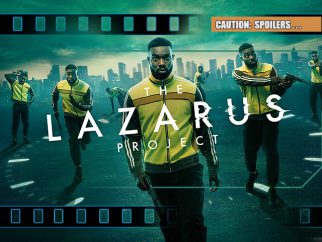
- Story9
- Acting9
- Direction9
- Production Design / VFX9

